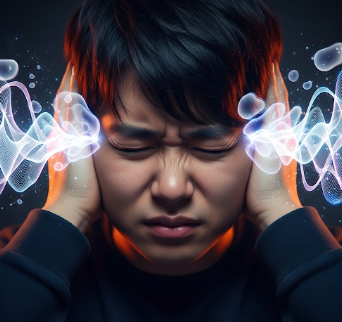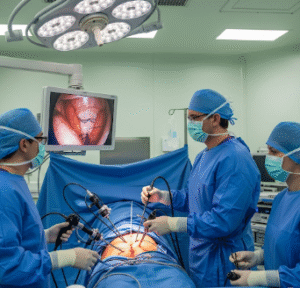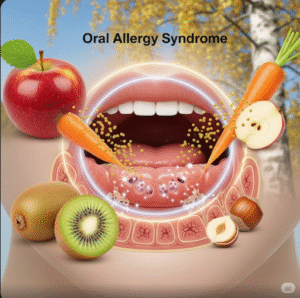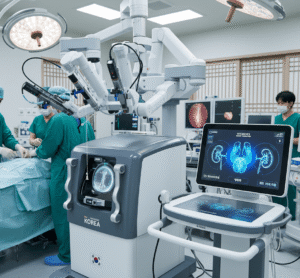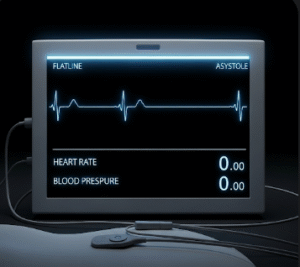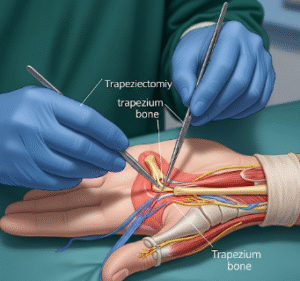➤ Overview
Tinnitus is the perception of ringing, buzzing, hissing, or other noises in the ears or head without an external sound source. It is a common condition that can be temporary or chronic, mild or severe, and may affect one ear or both. While tinnitus itself is usually not life-threatening, it can significantly impact quality of life, sleep, concentration, and emotional well-being.
In South Korea, tinnitus is evaluated by otolaryngologists (ENT specialists) and audiologists using advanced diagnostics such as audiometry, imaging, and electrophysiological tests. Early assessment helps identify underlying causes and provides interventions to reduce symptoms and improve daily functioning.
➤ Key Facts
→ Tinnitus affects millions worldwide, including a significant population in Korea.
→ It can be temporary or chronic, lasting from minutes to years.
→ Tinnitus is often associated with hearing loss, noise exposure, and age-related changes.
→ Other risk factors include ear infections, ototoxic medications, cardiovascular conditions, and stress.
→ In Korea, tinnitus clinics use modern audiology equipment, sound therapy, and counseling programs.
→ Persistent tinnitus may contribute to anxiety, depression, insomnia, and reduced concentration.
→ Early evaluation is crucial to prevent worsening of symptoms and identify treatable causes.
➤ What is Tinnitus?
Tinnitus is defined as the perception of sound without an external source. It can be classified as:
→ Subjective tinnitus – Heard only by the patient; the most common form.
→ Objective tinnitus – Rare; audible to a clinician using a stethoscope or microphone.
→ Pulsatile tinnitus – Rhythmic, often in sync with the heartbeat; may indicate vascular issues.
→ Non-pulsatile tinnitus – Continuous or intermittent ringing, buzzing, or hissing.
→ Acute vs. chronic – Acute tinnitus may be temporary after noise exposure; chronic lasts longer than 6 months.
→ Tone vs. noise-like – Can be a pure tone, ringing, buzzing, hissing, clicking, or roaring sound.
In Korea, specialists determine tinnitus type, severity, and possible triggers to tailor treatment effectively.
➤ What Symptoms are Related to Tinnitus?
Tinnitus can present alongside other auditory and systemic symptoms:
→ Hearing loss → Often associated with age-related or noise-induced hearing impairment.
→ Ear fullness or pressure → May indicate Eustachian tube dysfunction or middle ear issues.
→ Vertigo or dizziness → Can accompany inner ear disorders like Meniere’s disease.
→ Sensitivity to sound (hyperacusis) → Increased discomfort with everyday sounds.
→ Sleep disturbances → Difficulty falling or staying asleep due to persistent noise perception.
→ Concentration difficulties → Reduced focus at work or during daily activities.
→ Emotional symptoms → Anxiety, stress, or depression triggered by chronic tinnitus.
→ Pulsatile perception → A rhythmic sound in sync with heartbeat, often vascular in origin.
➤ What Causes / Possible Causes?
Tinnitus may result from auditory system dysfunction, systemic conditions, or external factors:
→ Hearing loss – Age-related (presbycusis) or noise-induced.
→ Ear infections – Otitis media or inner ear infections.
→ Ototoxic medications – Certain antibiotics, chemotherapy drugs, or high-dose NSAIDs.
→ Meniere’s disease – Inner ear disorder causing vertigo, hearing loss, and tinnitus.
→ Temporomandibular joint (TMJ) disorders – Jaw dysfunction affecting auditory nerves.
→ Vascular conditions – High blood pressure, atherosclerosis, or carotid artery anomalies.
→ Head or neck trauma – Injuries impacting auditory pathways.
→ Stress and anxiety – Exacerbate perception of ringing or buzzing.
→ Earwax blockage – Obstruction can lead to transient tinnitus.
➤ When Should I See My Doctor?
Immediate evaluation is recommended if tinnitus is accompanied by alarming or sudden symptoms:
→ Sudden onset of tinnitus with hearing loss in one ear.
→ Vertigo, imbalance, or severe dizziness.
→ Pulsatile tinnitus → may indicate vascular or circulatory problems.
→ Neurological symptoms → Weakness, facial droop, or numbness.
→ Persistent tinnitus lasting more than a few weeks without improvement.
→ Ear pain, discharge, or signs of infection.
→ In Korea, ENT specialists and audiologists provide rapid assessment and diagnostic testing to prevent progression.
➤ Care and Treatment
Tinnitus management focuses on addressing underlying causes and reducing symptom impact:
→ Hearing evaluation and management – Hearing aids may improve perception and reduce tinnitus severity.
→ Sound therapy – White noise machines, masking devices, or smartphone apps to reduce perception.
→ Medication review – Adjusting or stopping ototoxic drugs under physician guidance.
→ Cognitive behavioral therapy (CBT) – Helps manage stress and emotional response to tinnitus.
→ Stress reduction techniques – Meditation, relaxation exercises, or yoga.
→ Earwax removal – Treating obstructions to alleviate symptoms.
→ Lifestyle modifications – Reducing caffeine, alcohol, and exposure to loud noise.
→ Regular monitoring – Audiometry and follow-up to assess symptom progression.
➤ Treatment Options in Korea
South Korea offers advanced diagnostic and therapeutic approaches for tinnitus:
Diagnosis in Korea
→ Audiometry and hearing tests – Identify hearing loss patterns.
→ Tympanometry – Evaluates middle ear function.
→ Otoacoustic emissions testing – Assesses cochlear health.
→ Imaging – MRI or CT scans if vascular or structural causes are suspected.
→ Neurological evaluation – Rule out central causes of tinnitus.
Medical Treatments in Korea
→ Pharmacotherapy – Medications for underlying causes or symptom relief.
→ Sound therapy – Personalized masking or noise devices.
→ Cognitive behavioral therapy – Mental health support for coping with chronic tinnitus.
→ Earwax management – Professional removal and cleaning.
Advanced Therapies in Korea
→ Tinnitus retraining therapy (TRT) – Combines sound therapy and counseling to habituate perception.
→ Minimally invasive procedures – For vascular or structural abnormalities causing pulsatile tinnitus.
→ Multidisciplinary care teams – ENT specialists, audiologists, psychologists, and neurologists collaborate for comprehensive care.
Rehabilitation & Support in Korea
→ Patient education on managing triggers and noise exposure.
→ Counseling for sleep improvement, stress management, and emotional well-being.
→ Follow-up assessments for hearing function and tinnitus intensity to guide long-term management.

